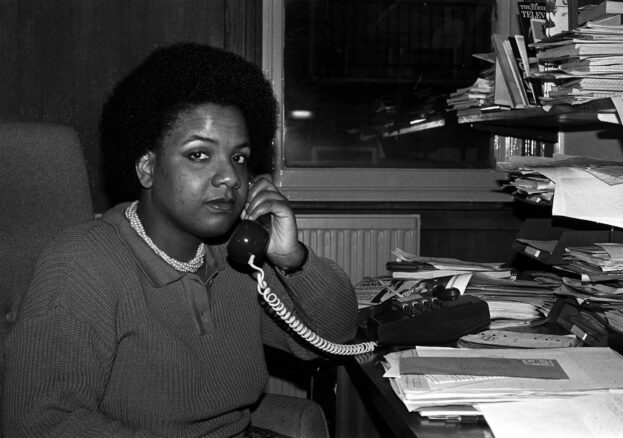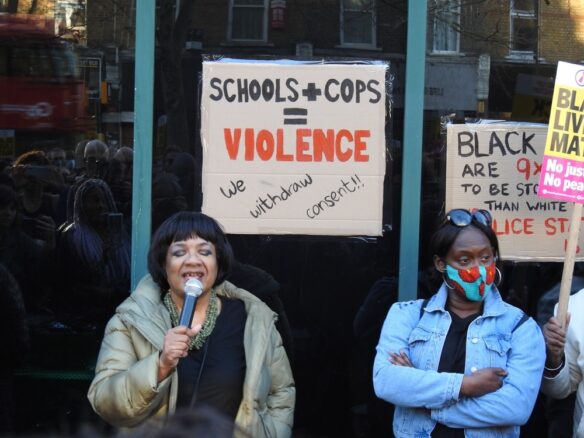
In a political landscape that often marginalises those who dare to be different, Diane Abbott has stood tall for over three decades as a beacon of resilience, transformation, and unwavering commitment to justice. To understand the significance of her contributions, one must view her not merely as a politician, but as a revolutionary figure whose impact on British society transcends the confines of Westminster. Her story, much like her legacy, is deeply intertwined with the broader struggles of race, class, and gender in Britain, offering a profound narrative of perseverance and change.
Diane Abbott’s story begins in post-war Britain, an era in which the country was reshaping itself after the devastation of World War II. Born in 1953 to Jamaican immigrants in Paddington, London, she was raised in a working-class household where the values of hard work and education were paramount. Diane’s parents were part of the Windrush generation, a wave of Caribbean migrants invited to Britain to help rebuild the country’s economy after the war. Her father worked as a welder, while her mother was a nurse. Like many immigrants of their time, they faced prejudice and hardship but remained determined to carve out better lives for their children.
Reflecting on her parents’ journey, Diane once said: “To leave your home and your country and travel thousands of miles to make a better life in Britain does take courage, and so I suppose I inherited my courage from my parents.” This sense of inherited resilience would guide her throughout her life and influence her political journey.
Her early years were marked by the tension of excelling academically while facing the discrimination that often came with being one of the few Black students in predominantly white institutions. Despite her impressive grades, some teachers discouraged her ambitions. One particularly poignant moment came when a teacher told her not to apply to Cambridge University. Diane was resolute, however, stating, “They tried to tell me that I couldn’t make it. And I had to say to them; ‘But I think I can do it, and that’s what matters, isn’t it?’” She applied and was accepted, becoming one of the few Black women at Newnham College.
The Path to Politics
After graduating from Cambridge, Diane’s career took her into the civil service, where she worked as a fast-streamer in the Home Office, a rare achievement for a Black woman at the time. Her role gave her insight into the inner workings of the British government, and she quickly became aware of the institutional barriers that prevented people from marginalised communities from accessing power and influence. After a stint as a Race Relations Officer for the National Council for Civil Liberties (now Liberty), she transitioned into journalism, working as a researcher and reporter at Thames Television, and later as a press officer at the Greater London Council under Ken Livingstone.
Her entry into politics was deeply influenced by pivotal moments in British racial history. One such moment was the Mangrove Nine trial, which left a lasting impression on Diane. “That [the Mangrove Nine trial] had a tremendous impact on me. It was one of the things that shaped my politics about racism in society and in the criminal justice system,” she explained, recalling how this case exposed the deep-rooted injustices within the British legal system.
Diane’s advocacy took a sharper turn during her work as a journalist when the 1981 New Cross fire tragedy struck, killing 13 Black children. She witnessed the indifference of mainstream media and the establishment’s failure to acknowledge the significance of the event. This marked a defining moment in her activism. It led her to participate in the Black People’s Day of Action, an experience that underscored for her the power of grassroots mobilisation and community solidarity.
In 1982, Diane was elected to Westminster City Council. Her time as a councillor introduced her to the daily struggles faced by London’s inner-city residents, and she quickly built a reputation for being a fierce advocate for Black and working-class communities. This reputation helped propel her to national prominence, and in 1987, Diane made history by becoming the first Black woman elected to the House of Commons as the MP for Hackney North and Stoke Newington.
A Trailblazer in Parliament
Diane’s election to Parliament in 1987 marked a significant shift in British politics. Alongside fellow Black MPs Bernie Grant, Paul Boateng, and Keith Vaz, she symbolised a new era of representation in Parliament. Their victories were not just personal achievements but collective milestones for Black Britons, signalling a more inclusive political landscape.
Once in Parliament, Diane’s mission became clear: to be a voice for those who had long been excluded from the political process. She was a vocal advocate for racial equality, education reform, and social justice, never shying away from speaking uncomfortable truths in a chamber where she often stood out, not just as a Black woman, but as someone willing to challenge the status quo. Her advocacy work, particularly for education, has had long-lasting impacts.
In 1999, Diane founded the “London Schools and the Black Child” initiative, which aimed to close the achievement gap between Black students and their peers. “The concerns which Black people voice about service delivery, housing, unemployment, and security are important to white people as well. I don’t think that providing good education and decent housing are marginal issues. The Black agenda is not a marginal agenda,” she said, framing her work as an essential part of the broader fight for equality.
Her tireless efforts paid off, and her advocacy helped raise awareness of the systemic inequalities that Black students faced in the education system. Her initiative led to improvements in educational outcomes for many Black children, although she has remained vigilant in her criticism of disproportionate school exclusions.
Shadow Cabinet and National Influence
Diane’s influence within the Labour Party grew steadily, and she was eventually appointed Shadow Health Secretary and later Shadow Home Secretary under Jeremy Corbyn. These roles brought her to the forefront of key national debates on immigration, policing, and health care, with her tenure as Shadow Home Secretary being particularly significant. She took strong stances on controversial issues, including the Conservative government’s hostile environment policy, which she described as perpetuating injustices reminiscent of the treatment of her own parents’ Windrush generation.
Her role as Shadow Home Secretary was also defined by her fierce opposition to draconian immigration laws and her defense of civil liberties. She was unflinching in her criticism of policies that marginalised immigrants, particularly the Windrush scandal, which saw legal residents wrongfully detained and deported. Her passionate advocacy for these communities resonated deeply with the values she had cultivated since her early days in politics.
During her tenure, Diane faced a barrage of personal attacks and media scrutiny, but she remained focused on the bigger picture. “It’s the sense that you carry, in a general sense, people’s hopes with you, that helps to keep you moving forward,” she said, reflecting on her resilience in the face of adversity.
The 2024 General Election Victory
In 2024, Diane Abbott once again triumphed in the general election, securing her position as the MP for Hackney North and Stoke Newington amid a historic Labour landslide. Despite facing challenges within her own party prior to the election, including a row that threatened to bar her from standing, Diane emerged victorious with 23,355 votes. She defeated Conservative candidate David Landau and Green Party candidate Antoinette Fernandez, marking her 10th consecutive election victory in the constituency she has represented since 1987.
Labour MP David Lammy, reflecting on her legacy, said: “Diane Abbott paved the way for people like me to be in Parliament. She took the hits, she stood firm, and she didn’t let them push her out. She’s a pioneer, and we owe her a great deal.” This sentiment is echoed by many of her peers, who see her as a trailblazer who has reshaped the political landscape.
Overcoming Adversity
Throughout her career, Diane has faced a level of scrutiny and vitriol that few politicians have experienced. As a Black woman in public life, she has been subjected to relentless racism and misogyny, both from the media and the public. She has spoken openly about the abuse she has received, particularly on social media, where she has been the target of countless racist and sexist attacks. Her experience as a politician has often been a lonely one, yet she continues to stand strong.

One of her most significant challenges came in 2023, when she was temporarily suspended from the Labour Party after a letter she wrote to The Observer sparked controversy. Although she quickly apologised, clarifying her remarks, the incident highlighted the difficult position she occupies as a Black woman in a predominantly white political institution. Nonetheless, the support from her constituents and activists ensured her reinstatement and her continued political success.
Legacy and Inspiration
Diane Abbott’s legacy is multifaceted. She has paved the way for future generations of Black and minority ethnic politicians and inspired countless young people to believe they, too, have a place in British politics. Her election in 1987 marked a turning point in British history, and her ongoing presence in Parliament continues to inspire.
Her work on education, immigration, policing, and healthcare has had a lasting impact on British society, challenging systemic inequalities and advocating for a more just and equitable future. As Diane herself put it: “The concerns which Black people voice about service delivery, housing, unemployment, and security are important to white people as well… The Black agenda is not a marginal agenda.”
As one of the longest-serving MPs in the House of Commons, Diane Abbott’s career stands as a testament to her strength, resilience, and unwavering dedication to justice and equality. She has shown that progress is not inevitable—it is fought for, day by day, and year by year. And through her perseverance, she has become one of the most significant figures in British politics.
